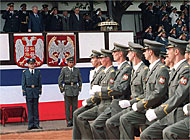
Belgrade asks Swiss for help in democratising security forces

The fledgling democratic government in Yugoslavia has asked a Swiss-funded centre to help it democratise its security forces. After returning from a trip to Belgrade, the head of the Centre for the Democratic Control of Armed Forces (DCAF) told swissinfo about the challenges that entails.
“There’s a clear feeling in Belgrade that they need to move towards Europe, not just institutionally, but also in terms of political culture,” says Theodor Winkler, director of the Geneva-based centre.
“President Kostunica believes we can respond to a direct need of his government,” he told swissinfo.
The Centre is still only six months old, but already it has been asked by three countries – Yugoslavia, Bosnia-Herzegovina and Ukraine – to help overhaul their security forces. The DCAF is also a key plank of Switzerland’s contribution to Partnership for Peace
“The Yugoslavs feel they have lost a decade – and it wasn’t the 1820s, it was the 1990s,” Winkler says.
At the end of the Cold War, Yugoslavia was the communist country with the closest ties to the West. It has since seen the other countries of Central and Eastern Europe joining Nato and queuing up to become members of the European Union.
“They feel they’ve lost out and now they need to catch up,” Winkler says.
He says the first step must be to strengthen democracy by drafting new legislation to put in place political controls not only on the armed forces, but also the police, the intelligence services and paramilitary forces – the former pillars of dictatorship.
“These have to be converted into pillars of democracy, which serve the citizen,” he points out. He says Ukraine has made great strides in downsizing its armed forces, but still has 500,000-strong police force.
Another area where these countries in transformation need help is learning how to draft a budget, and how to read a budget. Indeed, the government in Bosnia-Herzegovina has asked for the DCAF’s help in precisely this area.
The Yugoslav security forces are closely identified with the Milosevic regime, and nationalist sentiment still runs high among the rank and file. The real test of its commitment to democracy may come when Montenegro or Kosovo try to break away from Yugoslavia.
“Things are still in a state of flux. But I have spoken to the Serbian Interior Minister and the leadership of the armed forces. There’s not the slightest doubt they see the need for reform,” Winkler added. “The question is which reforms, and at what time.”
As was the case in other former communist countries, the expectations of the Yugoslav people may be higher than the international community – or the Yugoslavs themselves – can satisfy in the immediate future.
“These changes take many years to put in place,” Winkler says. “This is a process that will have several stages. I’m convinced that everybody wants to move forward – perhaps not towards the same goal, perhaps not at the same speed, but there’s a clear understanding that reform is needed.”
The DCAF is not alone in trying to democratise the institutions of Yugoslavia. The Centre is collaborating closely with the Organisation for Security and Cooperation in Europe (OSCE), which is leading attempts to overhaul the police force.
The Danish government is helping to redraft police legislation, while the Council of Europe is involved in the reform of the judiciary and establishing the rule of law – another key prerequisite for establishing a culture of democracy.
“We can help by providing expertise,” Winkler says, pointing out that DCAF employees include former senior members of the Polish and Hungarian governments.
“The Yugoslav government wants to have an idea what the situation will be in 10 or 15 years, so that it can make the right decisions now. Through us, they can talk to people who have successfully negotiated this transformation,” he adds.
Since last month, virtually all the countries of Central and Eastern Europe are members of the DCAF Foundation Council. They include all the states of the former Yugoslavia.
The Centre was inaugurated in late October 2000 by the then Swiss president and defence minister, Adolf Ogi. At the time it was estimated that it would reach its “cruising altitude” by 2003, when it will have a budget of SFr10 million.
This year, the federal authorities had earmarked SFr 5 million for the DCAF, but such has been the demand for help from countries in Eastern Europe, that Winkler has asked for an additional SFr 1.3 million in funding.
The Balkans is a priority area for Swiss foreign policy and the work of the Centre plays an important role in this.
“Every war in southeast Europe costs us enormous sums. These conflicts have feet and those feet bring them to Switzerland,” Winkler says.
At the end of the Kosovo conflict, 210,000 Kosovars, or 10 per cent of the population, had fled to Switzerland. Half of the refugees in camps in Albania and Macedonia said they wanted to go to Switzerland, because they had family there.
“We are a frontline state, whether we like it or not. It’s not just an ethical issue to prevent conflict and promote democracy. It’s hard-nosed national interest,” Winkler says.
by Roy Probert

In compliance with the JTI standards
More: SWI swissinfo.ch certified by the Journalism Trust Initiative





























You can find an overview of ongoing debates with our journalists here . Please join us!
If you want to start a conversation about a topic raised in this article or want to report factual errors, email us at english@swissinfo.ch.